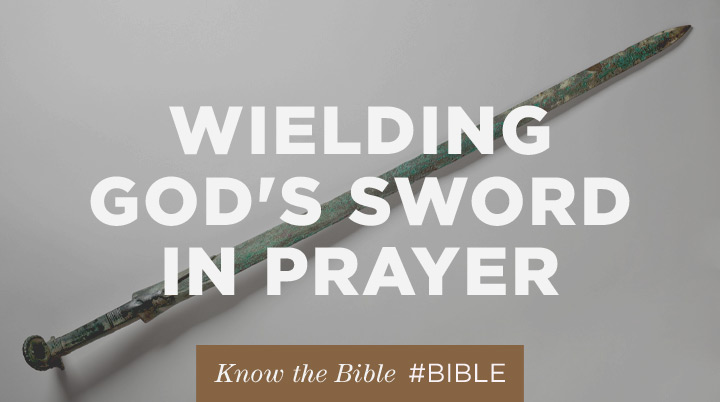Latest
-
Objections to the Christian Faith from the Unchurched and De-Churched
 Tue Dec 02, 2014
Tue Dec 02, 2014
by Resurgence -
Craig Groeschel: We Innovate for Jesus
 Tue Oct 14, 2014
Tue Oct 14, 2014
by Resurgence -
Mark Driscoll: Revelation
 Tue Oct 07, 2014
Tue Oct 07, 2014
by Resurgence -
RESURGENCE LEADERSHIP #034: JOHN PIPER, WHY I TRUST THE SCRIPTURES, PART 2
 Tue Sep 30, 2014
Tue Sep 30, 2014
by Resurgence -
Resurgence Leadership #033: John Piper, Why I Trust the Scriptures, Part 1
 Tue Sep 23, 2014
Tue Sep 23, 2014
by Resurgence

Archives
Wielding God’s sword in prayer

God’s word is a sharp two-edged sword that discerns thoughts and intentions of the heart (Heb. 4:12; Eph. 6:17). But how do we wield it?
While the study of Scripture renews our minds (Rom. 12:1–2), study alone can limit God’s word to textbook status. God’s word changes hearts and actions once applied (2 Tim. 3:16–17). And one of the best ways I’ve found to apply God’s word is to pray Scripture.
Praying Scripture allows God’s word to penetrate our hearts and saturate our souls. In this culture of mass information absorption, praying Scripture allows us to get back to God, pray over those we love, and ruminate on God’s goodness and sovereignty while getting every morsel of nourishment out of his life-giving word. As we pray Scripture, we affirm its truth. We place ourselves within the context of his story, and his purpose becomes uniquely personal for us. Placing ourselves within the context of Scripture in prayer releases praise and thanksgiving for not only God’s attributes but also his very existence.
Praying Scripture allows God’s word to penetrate our hearts and saturate our souls.
Actively speaking the words of God in prayer enables us to choose truth over lies. And in the process, our desires change. Those things we normally approach God for—our checklist of petitions—become subordinate to God’s purpose and plan when we pray them within the context of Scripture.
And I’ve seen great benefits in praying Scripture over my children, not as a chant to ward off the boogeyman or as a positive affirmation, but as a profoundly fruitful process that trains them to know that God is good and that his word is true, eternal, and extremely practical. As my children grow, I want them to know that when they can’t form their own words into prayers, the Bible will guide them. I want my kids to understand that God’s word is powerful and nourishing, and a lamp to their feet (Ps. 119:105).
How can you begin to pray Scripture over your children? Here are some specific examples to introduce at varying life stages. While you may want to pray any of these Scriptures at any life stage and even preemptively, I’ve grouped them based on what Scriptures I pray most frequently over my own children of varying ages.
Infants and Toddlers:
- That they would grow in wisdom and favor and stature before God and man (Luke 2:52; 1 Sam. 2:26).
- That they would love the Lord with all of their heart, mind, soul, and strength, and love others as they love themselves (Luke 10:27).
- That God has chosen to save them before the foundation of the world (Eph. 1:4).
- That they become a man (or woman) after God’s own heart and do God’s will (Acts 13:22).
School Age Children:
- That they would love God’s house, the church (Ps. 122:1), and that they would always be planted in it (Ps. 92:13).
- That when they are afraid they will trust in God (Ps. 56:3) and know that God’s perfect love casts out all fear (1 John 4:18).
- That the Lord’s name is a strong tower and that when they run to him they are safe (Prov. 18:10).
- That they will comprehend with all the saints the depth of God’s love for them (Eph. 3:18–19).
- That they will put on the whole armor of God and stand firm against the schemes of the enemy (Eph. 6:10–18).
Teenagers and Adults:
- That God is always with them wherever they go, that his hand guides them and his right hand holds them fast (Ps. 139:7–10).
- That all things work for good for those who love God and are called according to his purpose (Rom. 8:28).
- That they are saved to the uttermost and Jesus always lives to intercede for them (Heb. 7:25).
- That nothing can separate them from the love of God through Jesus (Rom. 8:38–39).
- That they are made in the image of God, whether male or female (Gen. 1:27).
- That God’s power gives them everything they need to live a holy life (1 Pet. 1:3).
- That they will submit to God and resist the devil (James 4:7).
- That they will ask God in faith for wisdom (James 1:5–8).